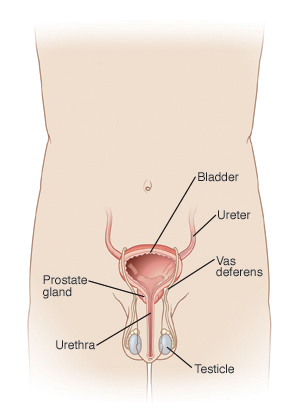The prostate is a gland at the base of the bladder. As some people who were assigned male at birth get older, the prostate may get bigger. This problem is called benign prostatic hyperplasia (BPH). BPH puts pressure on the urethra. This is the tube that carries pee (urine) from the bladder to the penis. It may interfere with the flow of pee. It may also keep the bladder from emptying fully.
Symptoms of BPH include trouble starting to pee and feeling as though the bladder isn’t emptying all the way. It also includes a weak pee stream, dribbling and leaking of pee, and frequent and urgent peeing (especially at night). BPH can increase the risk of urinary infections. It can also block off pee flow completely. If this occurs, a thin tube (catheter) may be passed into the bladder to help drain pee.
If symptoms are mild, no treatment may be needed right now. If symptoms are more severe, treatment is likely needed. The goal of treatment is to improve pee flow and reduce symptoms. Treatments can include medicine and procedures. Your healthcare provider will talk about treatment choices with you as needed.
Home care
The following guidelines will help you care for yourself at home:
-
Pee as soon as you feel the urge. Don't try to hold your pee.
-
Don't limit your fluid intake during the day. Drink 6 to 8 glasses of water or liquids a day. This prevents bacteria from building up in the bladder.
-
Don't drink fluids after dinner. This helps to reduce peeing during the night.
-
Don't take medicines that can make your symptoms worse. These include certain cold and allergy medicines and antidepressants. Diuretics used for high blood pressure can also make symptoms worse. Talk with your healthcare provider about the medicines you take. Other choices may work better for you.
Prostate cancer screening
BPH does not increase the risk of prostate cancer. But prostate cancer is a common cancer in people who were assigned male at birth. So screening is sometimes advised. This may help find the cancer in its early stages when treatment is most effective. Factors that can increase the risk of prostate cancer include being African American or having a father or brother who had prostate cancer. A high-fat diet may also increase the risk of prostate cancer. Talk with your healthcare provider to see if you should be screened for prostate cancer.
Follow-up care
Follow up with your healthcare provider, or as advised.
To learn more, go to:
When to get medical care
Call your healthcare provider right away if any of these occur:
-
Fever of 100.4°F (38°C) or higher, or as advised by your provider
-
Unable to pee for 8 hours
-
More pressure or pain in your lower belly (bladder)
-
Blood in your pee
-
Increasing low back pain that is not linked to injury
-
Symptoms of urinary infection (increased urge to pee, burning feeling when peeing, bad-smelling pee)
Featured in


